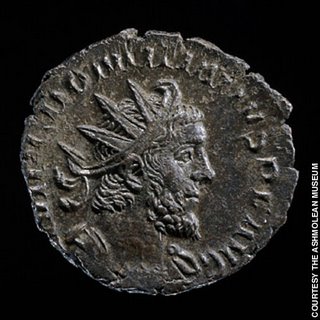 Who is this? Would you believe it's Domitianus, who was Emperor for... a few days? It's a crazy story actually...
Who is this? Would you believe it's Domitianus, who was Emperor for... a few days? It's a crazy story actually...The Story:
"During the chaos and confusion of the third century A.D., amid widespread disease, famine, and barbarian invasions, a brazen upstart seizes control of a breakaway state within the Roman Empire. He proclaims himself emperor only to disappear days later, his life and story lost, save for only the briefest of remarks in two fragmentary and unreliable sources. Then, an amateur treasure hunter scanning the green fields of Oxfordshire with a metal detector chances upon a small clay pot filled with more than 5,000 ancient Roman coins. A British Museum archaeologist brushing away centuries of corrosion and carefully picking apart bronze and silver pieces, discovers one exceedingly strange coin. Among the thousands of unremarkable ones, this coin carries an unfamiliar bearded face, a perplexing name, Domitianus, and most strikingly, the three letters IMP, short for imperator, or emperor."
But, it continues...
"Suddenly, the hunt was on for another coin, this one found not buried in the ground, but buried in the archives of a small provincial museum in southern France. The French coin, dug up in 1900, was deemed worthless at the time, a modern counterfeit depicting what was surely a made up emperor. Amazingly, the portrait on the supposed fake matches the strange coin in the British Museum, as does the image on the reverse side. Small characteristic markings provide the final confirmation; both coins had been struck from the same die or stamp. The French coin is not a fake, and the bearded man, not an imposter, but a lost emperor."
So, this then is one of Britain's forgotten emperors.
"Domitianus was only one of a string of short-lived usurpers, who claimed imperial power before the breakaway state was reincorporated in A.D. 274. The rebel emperors differed from their Roman counterparts in a number of significant ways. None of the Gallic rulers had been confirmed by the Roman Senate, a formality that was still regarded as a necessary step to laying claim to the Empire. As a result, they had a precarious relationship with the official Roman emperor. At best, the Roman emperor ignored the Gallic usurper, content to have him fight off barbarians and manage unruly local tribes. At worst, the two emperors clashed head on in violent battles that pitched Roman against Roman. It is unlikely that Domitianus would have ever seen Rome, or even the Italian peninsula; the common Roman citizen probably knew as much about him as we do today, that is, almost nothing. The self-proclaimed "emperors" were not considered to be emperors at all by most of the citizens; in fact, the Romans had a separate name for men like Domitianus, tyrannus, meaning anyone who had come to power illegitimately. Though the word did not necessarily carry the pejorative meaning of its English cognate, tyrant, rulers like Domitianus were clearly viewed as inherently different from men like Claudius Gothicus and Aurelian, two of the emperors who ruled at Rome during the period."
So, now you know.
No comments:
Post a Comment